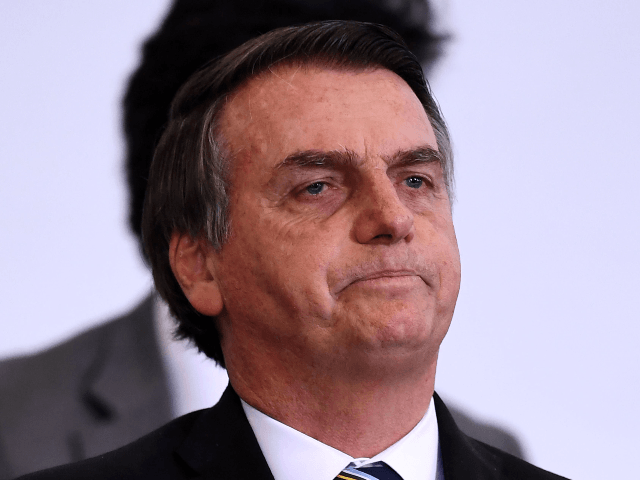Brazilian President Jair Bolsonaro announced the formation of “Doctors for Brazil” on Thursday, a program designed to replace the Cuban slave doctor program established by predecessor Dilma Rousseff in the country. The Cuban program, “More Doctors,” was established to form “guerrilla cells” in the country, Bolsonaro alleged.
Former President Rousseff, with the support of the Pan-American Health Organization (PAHO), inked a deal with the communist regime of Raúl Castro to establish the Mais Médicos (“More Doctors”) program before she was impeached and removed from office in 2016. The program imported thousands of Cuban doctors into Brazil to work in remote areas. Brasilia paid Havana directly for the doctors, which then passed on only a meager “living stipend” to the doctors.
A group of doctors sued the Brazilian government for their wages in 2017, but the courts at the time blocked the suit. After becoming president in January, Bolsonaro demanded Cuba pay its doctors fairly and let them travel freely and bring their families to Brazil. Cuba responded by ending the program and withdrawing its doctors, though many refused to comply and defected to Brazil.
Doctors who defect are banned from returning to their homeland for at least eight years.
The new Médicos pelo Brasil (“Doctors for Brazil”) program Bolsonaro launched on Thursday will substitute the Cuban doctors with domestic doctors, opening 18,000 jobs to Brazilians, mostly in the needy communities of the nation’s north and northeast. The program creates 7,000 more job openings in needy communities than the previous program. Health Minister Luiz Henrique Mandetta announced that the jobs would pay up to 31,000 reais (about $8,000), with higher salaries for those who work in more remote areas. To ensure quality healthcare, the government will require doctors to take a two-year family medicine course to qualify for the program.
Mandetta accused prior administrations of not delivering on their promise to help provide adequate healthcare to remote area. “They said, ‘We are going to bring doctors to small cities,'” he noted. “In the past program, the vast majority of them were in midsized cities and large capitals. In the semi-arid regions, the river cities, the population was neglected.”
The Cuban doctors who defected to Brazil would eventually be welcome into the program, Bolsonaro promised, but only after domestic doctors had the opportunity to take the jobs and the Cubans received proper training. Bolsonaro emphasized the point that, despite nearly incessant global leftist propaganda claiming Cuban doctors were among the world’s most elite medical professionals, the Cuban medical education system is often lacking.
“If the Cubans were so good, they would have been able to save Hugo Chávez’s life,” he said, noting that the Venezuelan dictator died in Cuba of cancer. “It didn’t happen, bad luck won out. If they were so good, Dilma and Lula [former president Luiz Inácio Lula da Silva] would have had Cubans [doctors] at Planalto [the Brazilian presidential palace], not Brazilians.”
Mais Médicos, he continued, was a plan to flood Brazil with sympathizers of the Cuban regime, a move that Havana has made in neighboring Venezuela. “The idea was to form guerrilla cells in Brazil,” he alleged. He did not specify whether the doctors themselves were the guerrilla members or if he meant that the doctors’ patients, often individuals living far from their nearest hospitals with no access to modern medicine, would be radicalized into fanaticism for the ruling party out of gratitude for the slave doctors. He did describe the doctor program as a “power project.”
Bolsonaro also discussed the plight of the doctors actually sent to Cuba, however, who were never paid a true salary and forced to live under draconian communist rules in Brazil, a free country.
“For years, mothers and fathers have been estranged from their husbands, wives, and their children,” Bolsonaro said. “Brazil lent itself to feeding a dictatorship – approximately 1.2 billion [reais, $309 million] was destined for Cuba, taken from the professionals who were here.”
To help the Cubans remaining in Brazil, Justice Minister Sergio Moro passed a decree this week granting legal rights to Cuban doctor defectors, who previously had a tenuous legal status as their presence in Brazil was contingent upon practicing medicine for the government. Among their new rights will be soliciting legal residency in the country, which will allow them to find jobs. While banned from the “Doctors for Brazil” program for now, they can seek private employment.
Bolsonaro insisted, however, that Cuban doctors must have the same qualifications as Brazilian doctors to practice.
“It’s not their fault if they studied in Cuba, or North Korea. Even if he or she went to Harvard, they have to study here,” Bolsonaro said. “That is the rule now.”
“This benefits us a bunch because we were working in this migration limbo, like asylum-seekers, and the majority of us were irregular [legally],” Dayaimy González Valón, a Cuban doctor who chose to remain in Brazil, told Diario de Cuba in a story published Thursday. González Valón estimated that as many as 762 Cuban doctors are married and have started families in Brazil, “but there are those of us who cannot enter Cuba for eight years, we are the ones who are happiest [with the Brazilian decree].” Without Moro’s new rule, these doctors could neither remain in Brazil nor go back to Cuba.
About 2,000 doctors disobeyed orders from Havana to return home after the Cuban government ended its doctor program with Brazil. Bolsonaro promised to offer political asylum to those doctors in November, given their status at home.

COMMENTS
Please let us know if you're having issues with commenting.